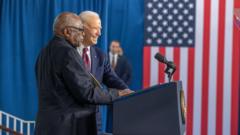As Senate Republicans aim to implement a proposal to sell between 2.2 million and 3.3 million acres of federal land to alleviate housing shortages in the West, the initiative meets with strong internal resistance and criticism from conservationists.
Proposed Sale of Federal Lands Sparks Controversy Among Senate Republicans

Proposed Sale of Federal Lands Sparks Controversy Among Senate Republicans
Senate Republicans present a contentious plan to sell millions of acres of federal land to fund housing development, igniting debates within the party.
Senate Republicans are reviving a controversial plan to sell millions of acres of federal land in a bid to support President Trump’s extensive tax and spending legislation. The initiative, detailed in a draft issued by the Senate Energy and Natural Resources Committee, aims for the Bureau of Land Management and the U.S. Forest Service to identify between 2.2 million and 3.3 million acres across 11 Western states for sale, which could generate up to $10 billion over five years.
Proponents argue that selling federal lands would convert government liabilities into valuable taxpayer assets, promoting affordable housing for American families. However, the proposal has already generated significant backlash, both from environmentalists and within Republican ranks. Notably, former Interior Secretary Ryan Zinke, a Republican from Montana, previously opposed a smaller proposal to sell around 500,000 acres, asserting that such sales would irrevocably diminish public land. “This was my San Juan Hill; I do not support the widespread sale or transfer of public lands,” Zinke contended.
The new legislation focuses on states including Alaska, Arizona, California, Colorado, Idaho, Nevada, New Mexico, Oregon, Utah, Washington, and Wyoming, but notably excludes Montana, Zinke’s home state. Critics express concerns over the long-term implications of such land sales, particularly regarding conservation and the permanence of public land status.
As internal debates unfold, Republican Senator Mike Lee from Utah emphasizes that this proposal is designed to add taxpayer value while addressing pressing housing needs. However, with opposition growing within the party, the fate of the proposal remains uncertain as it faces scrutiny and potential reevaluation in upcoming legislative discussions.






















